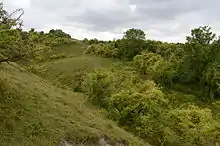Totternhoe Chalk Quarry
Totternhoe Chalk Quarry is a 13.4-hectare (33-acre) biological Site of Special Scientific Interest in Totternhoe in Bedfordshire.[1][2] Part of it lies in Totternhoe nature reserve, which is managed by the Wildlife Trust for Bedfordshire, Cambridgeshire and Northamptonshire.[3] The site is part of the Chilterns Area of Outstanding Natural Beauty.[4]
| Site of Special Scientific Interest | |
 | |
| Location | Bedfordshire |
|---|---|
| Grid reference | SP986225 |
| Interest | Biological |
| Area | 13.4 hectares |
| Notification | 1990 |
| Location map | Magic Map |
The site is a disused medieval quarry [5] for Totternhoe stone, a durable chalk which was used for buildings including Westminster Abbey. The steeply sloping spoil heaps have developed into grasslands which have a wide variety of flowers, including orchids.[6] Grass chalkland is a habitat under threat, and the site has a number of rare plant species, including great pignut. It also has butterflies such as the chalkhill blue and the nationally rare Duke of Burgundy.[1]
There is access from a footpath between Sewell Cutting and Totternhoe and from Totternhoe Knolls, which is also part of Totternhoe nature reserve.
References
- "Totternhoe Chalk Quarry citation" (PDF). Sites of Special Scientific Interest. Natural England. Retrieved 9 September 2015.
- "Map of Totternhoe Chalk Quarry". Sites of Special Scientific Interest. Natural England. Retrieved 9 September 2015.
- Trust noticeboard at the entrance to Totternhoe nature reserve near the National Trust car park
- Langslow, Derek. The Chilterns. English Nature. p. 39.
- 1446: Common Plea Rolls; http://aalt.law.uh.edu/AALT1/H6/CP40no740/bCP40no740dorses/IMG_1965.htm, county margin Bed, second entry; plaintiffs: Wm Halle & John Heyworth, defendant John Prudde; "quaryour"
- "Totternhoe". Wildlife Trust for Bedfordshire, Cambridgeshire and Northamptonshire. Retrieved 9 September 2015.